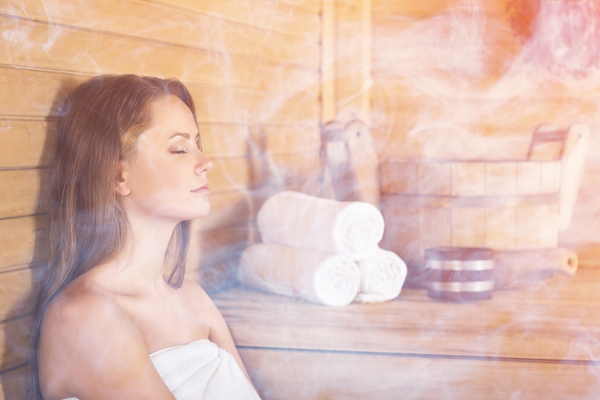Packed with physical and mental benefits, a Sauna routine can be amazing, especially during the winter, when arctic temperatures can make you crave heat wherever you can find it. And sauna—which can be used as both a noun and a verb—can have an amazing impact on your skin, body, and mood.
People use sauna for different reasons, whether at home, in the spa, or in a gym locker room. But you don’t necessarily need to leave the house to experience sauna benefits either. At-home sauna setups can range from around $100 to thousands of dollars depending on your choices. More expensive saunas tend to be ones to construct within your home or outdoors. Less expensive saunas are portable tent-like structures. Regardless of which you choose, make sure to follow any directions in setup and use. You don’t have to get totally naked to enjoy a sauna session either. “I’ve even recommended being fully clothed when taking a sauna to allow the clothing to absorb the sweat,” says Melanie Keller N.D., a naturopathic doctor. “You then remove the clothing immediately following the sauna before rising off.”
If you’ve never sauna’d before, you might want to ease into it. “Start with taking a sauna a few times per week for three months,” suggests Samantha McKinney, R.D., a registered dietitian at Life Time, a national fitness company with over 150 locations. You may begin with about 10 or 15 minutes at a time, and then may increase the length of your sessions based on your comfort level.
Here are just six of the wonderful benefits from hitting the sauna:
Helps preserve muscle mass
Not only can using a sauna clear your mind, it could potentially help you reach your fitness goals faster, says McKinney. One recent study found that sauna use can help preserve muscle mass, as well as help guard against inflammation.
Boosts heart health
The sauna also may increase cardiovascular endurance, as it may lower your resting heart rate over time. That said, time in the sauna isn’t exactly the same as a traditional sweat session in the gym. Because you’re not actually using your muscles the way you would be if you were working out, sauna isn’t necessarily a standalone fitness benefit. However, used in conjunction with a workout plan, you may find yourself being able to go harder for longer and recover more quickly than if you skipped the sauna.
Encourages water weight loss
Do saunas make you lose weight? While it may seem you’ve dropped a few pounds post-session, experts say this is water weight and that the sauna itself is not a weight-loss tool. When should you sauna in relation to your workout? McKinney recommends either using the sauna on your off days, or hopping in the sauna for a sweat session after you complete your strength training. Just make sure to hydrate adequately.
Improves skin strength
Using a sauna can also be amazing for your skin, although the specifics may be up to your skin type. The heat of the sauna can help you slough off dry skin cells more easily, and sweating can also lead to better circulation and enhanced collagen production.
Clears your pores
Sweating can also help cleanse your pores, all of which is to say your skin may seem more clear after using the sauna. But if you have a skin condition such as eczema or psoriasis, experts caution that the sauna may aggravate your skin. Speak to your dermatologist prior to using the sauna and stop if you notice any rashes or skin conditions develop. Since saunas can be moist, public saunas may be a breeding ground for bacteria and mold, which could cause a potential skin condition.
Helps you relax
Hitting the sauna can also be a great way decompress from the day, says McKinney, adding that many people like hitting the sauna in the evening as a way to unplug from the end of the day and unwind. Regardless of when you go into the sauna, it’s key to be hydrated and refrain from drinking alcohol prior to your sauna session.
As with most things, using a sauna can come with some risks, especially if you’re doing it wrong or going too often.
Dehydration
Because you’re sweating, you may be at risk of dehydration. That’s why it’s important to hydrate prior to hitting the sauna, and refrain from or limit alcohol. “Before using the sauna, make sure you’re hydrated enough that your urine is a pale yellow,” says McKinney. “A rule of thumb suggestion is to consume 20 ounces or so an hour before, and continue to sip on water leading up to entering. If you’re exercising beforehand, ensure you not only head into your workout hydrated, but also consume at least 16 ounces of water per hour of exercise.” McKinney adds you can also add electrolyte powder or sip on an electrolyte drink prior to hopping in the sauna.
Dizziness
You also want to pay attention to how you feel. If you’re dizzy or lightheaded, that means it’s time to get out, says McKinney. Before you step into the sauna, it can also be a good idea to talk through your plans with your doctor, particularly if you have any preexisting conditions. One 2018 systematic review study found that sauna risks may include low blood pressure and airway irritation, among other potential health hazards.
Temporary low sperm count
There may be reason to avoid frequent sauna visits if you’re trying to conceive: Some studies have found that sauna use may reduce sperm count. Just know that the effect is temporary. Regardless of whether you hit the sauna at home, at the gym, or at a spa, experiencing a sweat session or two should be a ‘no sweat’ experience that may leave you feeling healthier, happier, and stronger.
—
Photo Credit: Billion Photos / Shutterstock.com
